The Higher Education Innovation Fund (HEIF) Small Fund has resulted in the development of the Assistive Technology for Special Educational Needs and Disabilities (AT4SEND) Training Package as an add-on to the existing AT4SEND Android Application developed by Dr Paul Whittington, Dr Huseyin Dogan (Department of Computing & Informatics) and Professor Keith Phalp through Quality Research Funding.
The HEIF project (Principal Investigator: Dr Paul Whittington and Co-Investigators: Dr Huseyin Dogan, Dr Nan Jiang and Professor Keith Phalp) commenced in May 2021 and completed on 31st July 2021. Vers Creative UK, a Bournemouth application development company, were sub-contracted to develop the AT4SEND Training Package as an Android Application. As Vers Creative UK previously developed the Assistive Technology Recommendation section of AT4SEND, they were able to integrate the new Training Package. The AT4SEND Training Package was designed by Dr Paul Whittington, based on semi-structured interviews held with the assistive technology domain, including the Department for Education, Dorset Council and London Grid for Learning. These formed the basis of a requirements specification provided to Vers Creative UK to guide the development.
The AT4SEND Training Package consists of 3 sections: Training, Learn and Videos. The Training section consists of information focusing on popular categories of assistive technology hardware and software. The information is based on literature obtained from online sources and separated into descriptions, benefits and limitations. Based on the discussions with the assistive technology domain, it became evident that these were the most important aspects to focus on for a training package. Each category has a 5 question multiple-choice Quiz, which tests the user’s understanding of the assistive technology information. The questions were devised by Dr Paul Whittington and there is a defined pass mark of 80% for each Quiz. There is also a general Quiz of 20 questions to test the user’s understanding of all the assistive technology categories. The training results will be stored in the user’s AT4SEND profile.
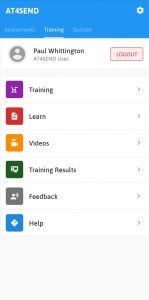
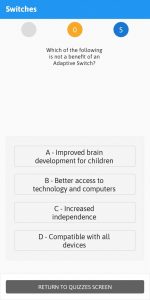
The Learn section consists of online assistive technology articles, so that users can find out more information about the general use of assistive technologies. This is supported by the Videos section where a selection of YouTube videos is provided to illustrate real world examples.
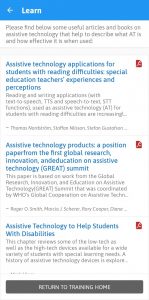
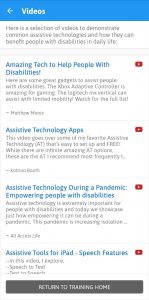
To assess the suitability of the AT4SEND Training Package, usability evaluations will be conducted during the autumn, involving mainstream and special educational needs schools, assistive technology industries, Department for Education and Policy Connect, who operate the All-Party Parliamentary Group for Assistive Technology. The HEIF funding has also been used for incentive Amazon vouchers that will be provided to the evaluation participants. The usability of the AT4SEND Training Package will be assessed by techniques, including the System Usability Scale and NASA Task Load Index. Dr Paul Whittington will be responsible for conducting these evaluations and analysing the results. We anticipate these being published in a future journal or conference publication, to be submitted later in the year.
We have received further funding towards the AT4SEND project from the Mazars Charitable Trust, which will be used to further develop the functionality of the Training Package based on the usability evaluation findings. The Training Package does not currently have images of assistive technologies due to the copyright issues of using online sources. In the future we will approach assistive technology manufacturers to obtain approval to use images of their products in AT4SEND. We will post updates on the development of the Training Package on our HCI Research Group website: https://hci.bournemouth.ac.uk/project/at4send/. We plan to disseminate AT4SEND as an Android Application on the Google Play Store.
We are very grateful for the funding from HEIF that has enabled development of the Training Package, increasing the functionality of AT4SEND from a recommendation system to an application that also provides assistive technology training. It is anticipated that this will raise awareness of assistive technologies to teachers, teaching assistants and support staff, which has been highlighted by the All-Party Parliamentary Group for Assistive Technology as an important area of development.
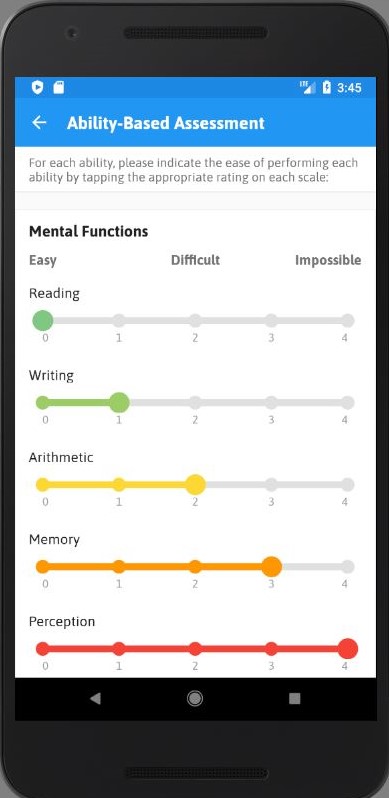











 REF Code of Practice consultation is open!
REF Code of Practice consultation is open! BU Leads AI-Driven Work Package in EU Horizon SUSHEAS Project
BU Leads AI-Driven Work Package in EU Horizon SUSHEAS Project Evidence Synthesis Centre open at Kathmandu University
Evidence Synthesis Centre open at Kathmandu University Expand Your Impact: Collaboration and Networking Workshops for Researchers
Expand Your Impact: Collaboration and Networking Workshops for Researchers ECR Funding Open Call: Research Culture & Community Grant – Apply now
ECR Funding Open Call: Research Culture & Community Grant – Apply now ECR Funding Open Call: Research Culture & Community Grant – Application Deadline Friday 12 December
ECR Funding Open Call: Research Culture & Community Grant – Application Deadline Friday 12 December MSCA Postdoctoral Fellowships 2025 Call
MSCA Postdoctoral Fellowships 2025 Call ERC Advanced Grant 2025 Webinar
ERC Advanced Grant 2025 Webinar Update on UKRO services
Update on UKRO services European research project exploring use of ‘virtual twins’ to better manage metabolic associated fatty liver disease
European research project exploring use of ‘virtual twins’ to better manage metabolic associated fatty liver disease